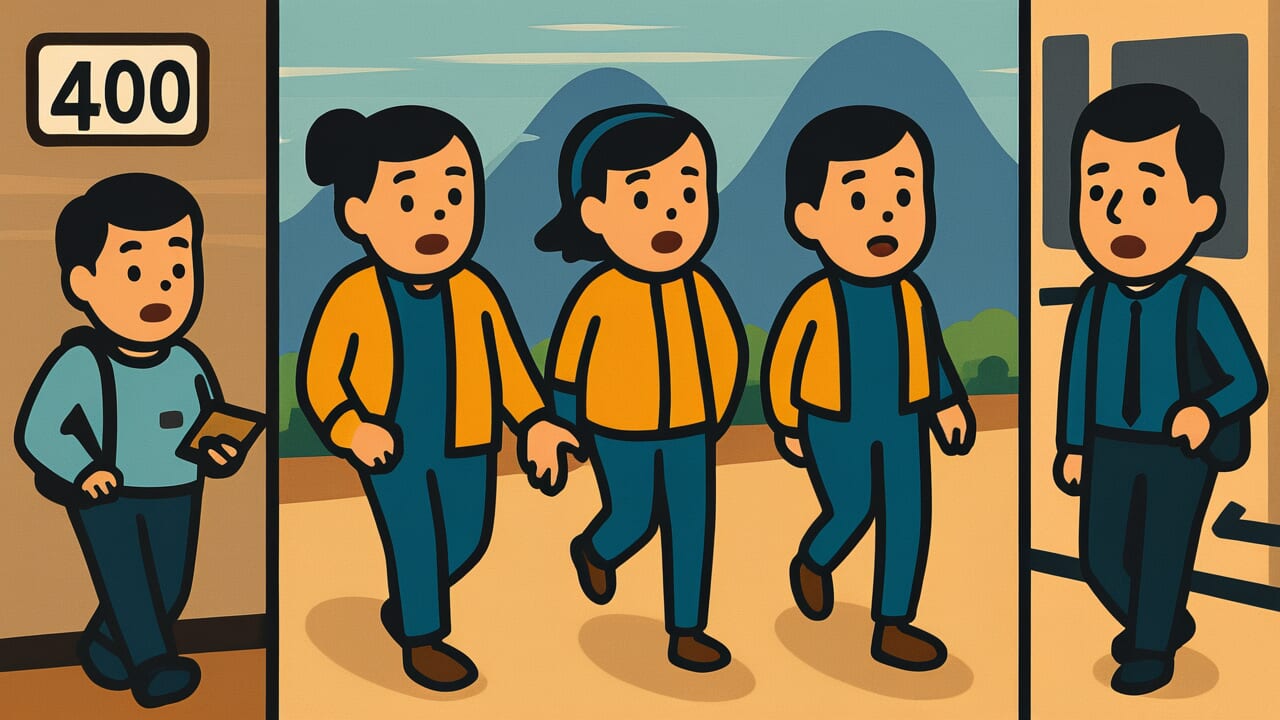How to Read “Idly thirty, restlessly forty”
Ukauka sanjū kyorokyoro shijū
Meaning of “Idly thirty, restlessly forty”
This proverb teaches a harsh lesson. If you spend your youth drifting without purpose, it’s too late when you panic in middle age.
It means you waste your days until age thirty without thinking. Then at forty, you look around frantically and start to worry. But by then, you can’t turn back the clock.
Life has times for preparation and times for harvest. Your youth is precious time for learning, working hard, and building foundations.
If you let this period slip by carelessly, fixing things later becomes very difficult. People use this saying especially when teaching young people about the value of time.
Middle-aged people also use it when looking back on their past. They express regret about being lazy in their youth.
Even today, people quote this proverb when discussing careers and life planning. It emphasizes the importance of taking action early.
Origin and Etymology
The exact first written record of this proverb is unclear. However, its structure offers interesting insights.
It uses mimetic words “ukauka” and “kyorokyoro” in a parallel expression. This creates a rhythmic, memorable format.
“Ukauka” describes an absent-minded state, spending time in a daze. The age of thirty was an important milestone in Edo period thinking.
Considering the average lifespan back then, thirty was already close to life’s halfway point. By that age, people were expected to have achieved something.
“Kyorokyoro” describes looking around restlessly without focus. You can picture someone at forty frantically looking around, trying to figure out where they stand.
But the proverb confronts them with a harsh reality. By that time, it’s already too late.
This saying probably originated in the world of Edo period merchants and craftsmen. If you waste your youth instead of training, mastering skills, and building connections, middle age brings irreversible consequences.
This real experience likely created such an expression. Naming specific ages strongly emphasizes life’s limited time.
Usage Examples
- That person is a case of idly thirty, restlessly forty—starting to study for certifications now is too late
- If you don’t prepare while you’re young, you’ll end up idly thirty, restlessly forty
Universal Wisdom
This proverb has been passed down because it brilliantly captures a fundamental human weakness. When we’re young, time feels infinite.
We think there’s tomorrow, next year, and we can always start over. This illusion is deeply carved into human psychology.
Youthful optimism sometimes helps people grow. But it also creates carelessness. We get swept up in immediate pleasures and postpone investing in our future.
Then when we notice, people around us have already built solid positions. Only we are left behind. This anxiety and regret is an emotion many people have experienced across time.
What’s interesting is that this proverb isn’t just a threat. It shows life’s timeline with specific ages.
The numbers thirty and forty make life’s stages feel real. Rather than abstract terms like “youth” or “middle age,” concrete ages pierce the listener’s heart.
Humans have a limitation—they can only learn from experience. However, proverbs as ancestral wisdom give us a chance to make others’ experiences our own lessons.
This proverb is a loving warning. It tells us to wake up while there’s still time.
When AI Hears This
The human brain has limits on how much information it can process at once. Think of “attention” as a limited resource, like a smartphone battery.
What’s interesting is that failures in your thirties and forties actually show a strategic shift in how your brain works.
The “idly” of your thirties is a failure in exploration mode. During this period, your brain is still exploring many possibilities.
It distributes attention thinly across a wide range to avoid missing new information or opportunities. But this strategy has a weakness.
Attention gets too scattered, and you can’t notice important changes right in front of you. In other words, you try to see the whole forest and trip over a stone at your feet.
The “restlessly” of your forties happens during the transition to exploitation mode. Your brain builds judgment criteria from experience about “what’s important” and starts directing attention selectively and deeply.
But now the opposite problem occurs. You focus too much on searching for specific information, and your field of vision narrows.
For example, when looking for something, you can’t find it even though it’s right in front of you. This is that phenomenon.
This two-stage failure is actually a rational process where your brain tries to optimize limited attention resources. From broad, shallow attention in youth to narrow, deep attention after gaining experience.
Neither is perfect, but you could say your brain is choosing the best strategy for surviving at each age.
Lessons for Today
What this proverb teaches you today is a truth. Your choices in this very moment create your future.
A day spent staring at your smartphone, a week that ends drifting along somehow, and before you know it a year has passed. The accumulation of such days becomes an irreversible gap when you finally notice.
But this lesson is never hopeless. Rather, it’s a message of hope. Because it suggests you can change starting today.
If you haven’t reached thirty yet, you still have plenty of time. Even if you’ve passed thirty, you have time until forty.
And even if you’ve passed forty, there are things you can start today toward fifty and sixty.
What matters is living each day with a sense of purpose. It can be small. Even a little bit each day, do something that contributes to your growth.
Read one page of a book, practice a new skill for ten minutes, make time to deepen relationships with important people. Such accumulation will save your future self.
Time flows equally for everyone, but you can decide how to use it.



Comments